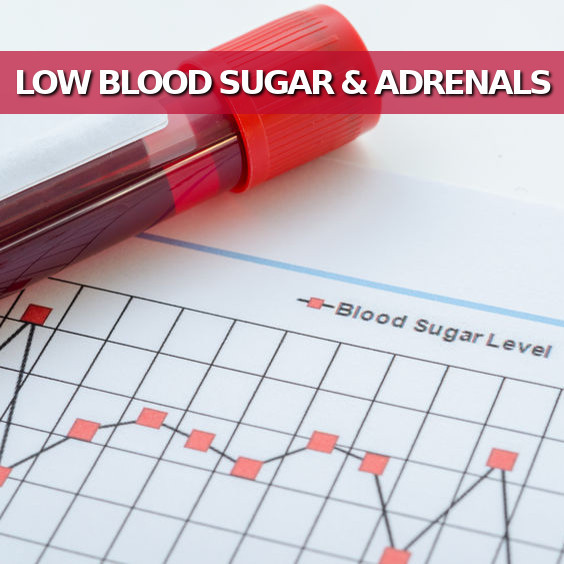How Adrenals and Thyroid Affect Blood Sugar
- Q: How are thyroid and blood sugar related?
- A: Low thyroid hormone levels decrease insulin, which raises blood sugar. In this way, hypothyroidism is one of the contributing factors to getting type-2 diabetes. While the direct effect of low thyroid is hyperglycemia, medical research shows that over time, hypothyroidism can also cause complex hormone imbalances that cause low blood sugar (hypoglycemia). There are several other factors to consider with regard to blood sugar dysregulation and diabetes, so the thyroid is not always a primary cause for these conditions. That said, in my clinical practice, I definitely consider imbalanced blood sugar to be one of the clues that we may need to investigate endocrine balance. ALSO SEE: Thyroid and Blood Sugar.
- Q: How does adrenal and thyroid balance work?
- A: Excessive/too-frequent fight-or-flight response in the body causes a chain of events that throws off adrenal and thyroid balance. During times of stress, the adrenal glands release (nor)adrenaline into the bloodstream to prepare us for “fight or flight” in response to danger. But how does the body recover from being on high alert? The answer is that the fight or flight response also releases a stress hormone called cortisol, that puts the immune system in overdrive while also increasing inflammation, slowing digestion and inhibiting thyroid function (triiodothyronine (T3) and thyroxine (T4)). While cortisol is necessary, ongoing (chronic stress) brings out cortisol’s negative aspects like inflammation, slowed digestion and an over-stimulated immune system leading to autoimmune diseases and hypothyroidism. This cluster of symptoms is often referred to as Adrenal Fatigue, which throws off the body’s delicate hormone balance. Slowed digestion, increased cortisol and the hypoglycemia that goes with hypothyroidism cause a cluster of symptoms including weight gain, inflammation, autoimmune disorders and insulin-resistance (pre-diabetes).
- Q: What is adrenal fatigue?
- A: This is a condition where the body is worn down over time by excessive fight or flight responses related to long-term stress. Treating adrenal fatigue and thyroid care are often done simultaneously because of the effects of cortisol on T3/T4 levels in the body. Over-active fight or flight responses results in elevated stress hormones (such as cortisol) over long periods of time. Cortisol suppresses thyroid function while also depressing everything from one’s immune system to metabolism and mood. Some in the medical field do not acknowledge this condition, however this is a mistake because the negative health consequences of too much stress are very well documented in the research. Everyone knows, stress kills. Long-term stress leads to increased instances of heart disease, diabetes, muscle pain, depression, digestion and ultimately greatly reduces life expectancy. The concept of adrenal fatigue simply names the already clear connection between chronic stress and the cluster of symptoms surrounding it.

Dr. Danielle Lockwood Q & A: thyroid, blood sugar and adrenal fatigue
Adrenals and Thyroid Function
In my Portland, Oregon medical practice, one of the most common problems people see me for are issues related to proper endocrine functions. Chronic stress is one of the major factors when it comes to imbalanced adrenals and thyroid. The common, albeit short-sighted, response to adrenal fatigue and thyroid care is to prescribe medications, however medications do have side effects and often do not treat the reason that led to the stress in the first place. For this reason, medications often stop working after awhile.
My status as a licensed primary care physician does allow me to prescribe medications, however when possible, I prefer more natural, gentle methods of restoring hormone balance. The idea that a doctor can simply run an easy test, see that thyroid levels are low and write up a prescription ignores the complex reality of how all of the body’s hormones interact with each other. Sometimes, we need to make many small adjustments that may even be as simple as food and lifestyle changes to bring about positive changes in how our bodies internally balance our hormones.
Some in the medical field resist the concept of “adrenal fatigue”. However, those same doctors will all easily acknowledge the widely proven negative health effects of long-term stress. Elevated stress hormones (such as cortisol) over long periods of time suppress thyroid function while also depressing everything from one’s immune system to metabolism and mood. Long-term stress leads to increased instances of heart disease, diabetes, muscle pain, depression, digestion and ultimately greatly reduces life expectancy. So, whether you call it “adrenal fatigue” or argue that condition isn’t real and name it “chronic long-term stress” instead, the fact remains that long-term stress does overstimulate the fight or flight response which leads to unhealthy changes in our bodies’ levels of stress hormones. Consequently, those over-produced stress hormones that are secreted by the adrenal glands do fatigue and prematurely wear out the body over time. But alas, we digress into fruitless semantics.
Thyroid and Blood Sugar
Among the other, lesser-known symptoms of hypothyroidism are digestive problems such as chronic constipation and imbalanced blood-sugar. These symptoms can be associated with long term stress, which is tied to imbalanced endocrine function. And, from what I’ve witnessed in my clinical practice, many patients have historically been treated for low thyroid hormone while the underlying cause of long-term stress’s effects on the body went untreated. When the adrenal glands are repeatedly overtaxed due to chronic stress, that small butterfly-shaped gland in our necks suffers damage. In an ironic twist of fate, conditions such as chronic blood sugar imbalances or underlying infections are side-effects of stress but also cause more stress on the body. As strange as it sounds, imbalanced blood-sugar and being prone to infection are both causes of stress and effects of stress at the same time.
While most of us are familiar with the usual suspects of emotional and environmental sources of stress, other things like inflammation or digestive issues due to diet, nutritional deficiencies, autoimmune responses and toxic exposures can also play a major role in increasing stress. Even simple things like the light exposure from staring at a smartphone screen too long can interfere with the body’s melatonin response, which reduces the length and quality of sleep, which increases our levels of stress hormones in the body. As mentioned in some of my other articles on endocrine function, alcohol and caffeine can also increase stress hormones that depress thyroid function over time. For this reason, one of the main treatments I often have to focus on with my patients is restoring proper balance to the adrenal glands through treatments and also through lifestyle and diet changes. Sometimes small changes in lifestyle or even mindset can have noticeable, positive effects on hormone balance.
Featured Article: Epstein Barr Virus and Thyroid
Adrenal Fatigue, Chronic Stress
All this is to say, this condition of chronic stress clearly leads to a number of serious, life-threatening health consequences, not the least of which is lowered thyroid function. The adrenal glands are small mountain peak-shaped glands located on the top portion of the kidneys. These glands are responsible for producing and secreting various hormones, predominately stress hormones such as cortisol, epinephrine/adrenaline, norepinephrine/noradrenaline and aldosterone. What most people are not aware of is that the these glands also secrete a small amount of sex hormones. In post-menopausal women and middle-aged men, the adrenal gland are responsible for producing small yet noticeable amount of estrogen, progesterone, and testosterone (and yes, healthy women do produce small amounts of testosterone just as healthy men produce small amounts of estrogen). The symptom for which a patient seeks medical attention varies because of the wide array of bodily hormones affected by endocrine imbalance.
Adrenal Fatigue and Thyroid Care

When fight-or-flight hormones are being constantly released into the body due to poor nutrition, work/life stress and lack of time for relaxation, symptoms such as early insulin resistance, weight gain, anxiety and of course: hormone imbalance begin to take hold. In situations of combined chronic stress there is usually a corresponding symptom of reduced thyroid function. This cluster of stress and endocrine imbalance often corresponds with digestive issues such as lowered metabolism, slowed digestion and chronic constipation. Often, when I have a chance to work with patients to clear up the underlying cause of stress (and by extension, balance hormone levels) relief of constipation and other digestive issues are a welcome bonus of having a healthier, more balanced endocrine system.
While the idea of adrenal fatigue may be hard for some in the medical community to accept, everyone practicing medicine is acutely aware that long-term stress left unchecked is a deadly condition that brings with it a host of health complications. Waiting until someone’s endocrine system is so out of balance that the patient develops adrenal insufficiency (Addison’s Disease), hypercortisolism (Cushing’s Disease) is a mistake with grave consequences. Ignoring chronic-stress because they don’t fit neatly into one-size-fits-all medical tests gets us nowhere. Every day, real people are experiencing the endocrine imbalance that follows chronic stress with no medical intervention until a life-threatening condition related to long-term stress like heart disease, diabetes or clinical depression crops up.
Terrain Wellness: Treating Thyroid, Low Blood Sugar and Adrenal Problems

If you have problems with endocrine function please come and see me, Dr Danielle Lockwood at our clinic, Terrain Wellness in Portland, Oregon. I am a licensed primary care physician (Naturopathic Doctor) and I am also a licensed Acupuncturist trained in classical Chinese medicine. While I can prescribe medications such as Synthroid and other hormone replacements, in most cases I prefer more gentle and natural ways to restore my patients to proper endocrine function.

